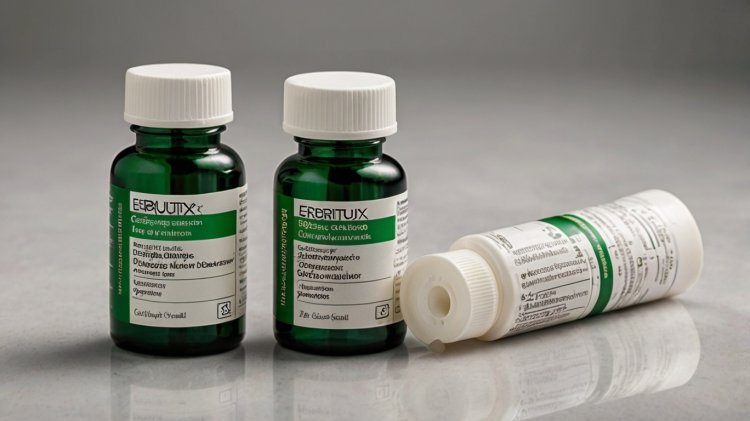Erbitux Dosage Guide: Uses, Administration, and Safety
Learn about Erbitux (cetuximab) dosages for head and neck cancer and metastatic colorectal cancer. Understand its administration, safety guidelines, and common questions.

Comprehensive Guide to Erbitux Dosages and Administration
Erbitux (cetuximab) is a prescription medication used in the treatment of certain cancers, including squamous cell carcinoma (SCC) of the head and neck and metastatic colorectal cancer (CRC). This medication, delivered intravenously by healthcare professionals, targets the epidermal growth factor receptor (EGFR) to slow cancer progression.
This guide explains the recommended dosages, how Erbitux is administered, and answers common questions about its use.
What is Erbitux?
Erbitux is a biologic therapy used to treat:
- Head and Neck Cancer (SCC): Often administered with radiation or chemotherapy.
- Metastatic Colorectal Cancer (CRC): Prescribed alone or in combination with chemotherapy regimens.
Its active ingredient, cetuximab, inhibits EGFR, playing a crucial role in controlling the growth and spread of cancer cells.
Erbitux Dosages and Administration
Erbitux is available in liquid form, delivered via intravenous (IV) infusion. Your doctor determines the dosage based on your body surface area (BSA), measured in square meters (m²), which is calculated using your height and weight.
Dosages for Head and Neck Cancer
-
Erbitux with Radiation Therapy:
- Starting Dose: 400 mg/m² infused over 2 hours, one week before radiation begins.
- Maintenance Dose: 250 mg/m² infused over 1 hour before each radiation session (typically for 6–7 weeks).
-
Erbitux with Chemotherapy (e.g., Cisplatin, Carboplatin, Fluorouracil):
- Weekly Doses:
- Starting dose: 400 mg/m² over 2 hours.
- Maintenance dose: 250 mg/m² weekly over 1 hour.
- Every Two Weeks:
- 500 mg/m² over 2 hours for all doses.
- Weekly Doses:
Dosages for Metastatic Colorectal Cancer
-
Erbitux Alone or with FOLFIRI (Irinotecan, Fluorouracil, Leucovorin):
- Weekly Doses:
- Starting dose: 400 mg/m² over 2 hours.
- Maintenance dose: 250 mg/m² weekly over 1 hour.
- Every Two Weeks:
- 500 mg/m² over 2 hours for all doses.
- Weekly Doses:
-
Erbitux with Encorafenib:
- Starting Dose: 400 mg/m² over 2 hours.
- Maintenance Dose: 250 mg/m² weekly over 1 hour.
How Erbitux is Administered
- Pre-Medication: Patients typically receive an antihistamine 30–60 minutes before Erbitux to reduce the risk of infusion reactions.
- Infusion Process: Delivered intravenously over 1–2 hours, depending on the dose.
- Monitoring: Healthcare professionals monitor patients during the infusion and for at least 1 hour afterward to manage potential side effects.
Understanding Boxed Warnings for Erbitux
Erbitux carries serious FDA warnings regarding:
-
Infusion Reactions:
- Symptoms: Fever, chills, breathing problems, or rash.
- Risk Factors: History of tick bites or red meat allergy increases susceptibility.
-
Cardiopulmonary Arrest or Sudden Death:
- Symptoms: Chest pain, shortness of breath, or dizziness.
- Risk Factors: Pre-existing heart conditions.
Pro Tip: Discuss your medical history thoroughly with your doctor to mitigate these risks.
FAQs About Erbitux Dosage
1. How long is Erbitux typically used?
Erbitux is often a long-term treatment, provided it remains safe and effective for the patient.
2. Does Erbitux need to be diluted before infusion?
No, Erbitux is infused directly without dilution, using a pump to ensure precise delivery.
3. Can Erbitux be used for lung cancer?
Erbitux is not FDA-approved for lung cancer but may be prescribed off-label in specific cases. Always consult your doctor for details.
4. What is the typical infusion duration for Erbitux?
Initial doses are infused over 2 hours, while maintenance doses take about 1 hour.
5. How is dosage calculated for each patient?
Dosages are determined using the patient’s body surface area (BSA), calculated based on height and weight.
Safety Tips for Erbitux Use
- Report Side Effects: Notify your healthcare provider about unusual symptoms like rash, chest pain, or swelling.
- Attend All Appointments: Regular check-ins ensure proper monitoring and dose adjustments if needed.
- Follow Pre-Treatment Guidelines: Always take prescribed antihistamines to reduce risks of infusion reactions.
Conclusion
Erbitux offers a targeted approach to treating certain cancers, such as head and neck SCC and metastatic CRC. By understanding its administration process, dosages, and potential risks, you can ensure the safest and most effective use of this medication. Regular communication with your healthcare provider is essential to address side effects and optimize treatment outcomes










